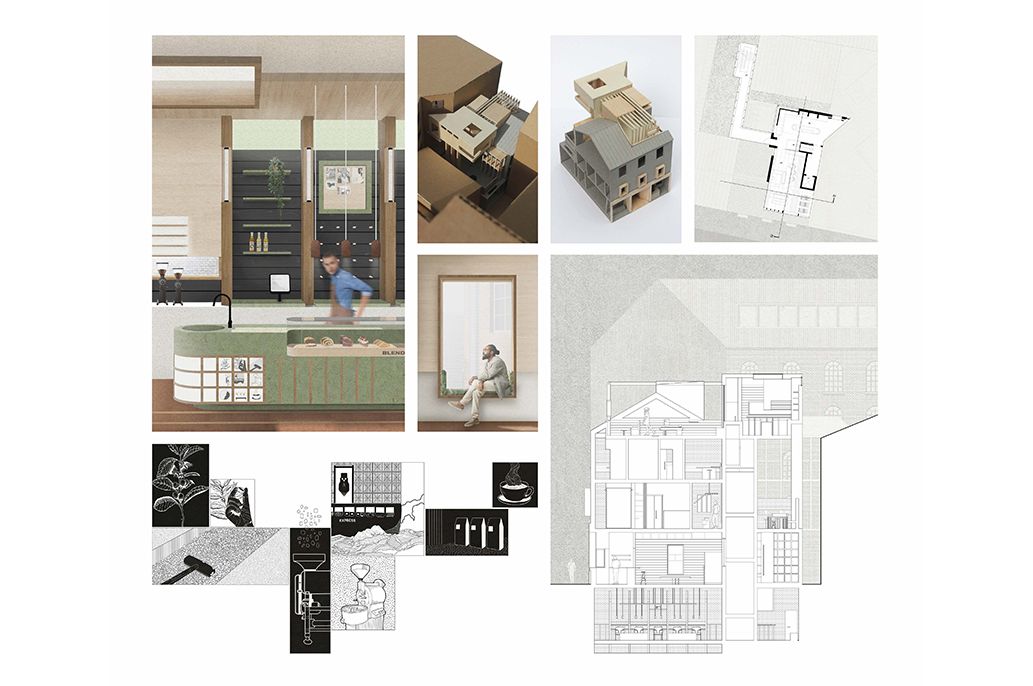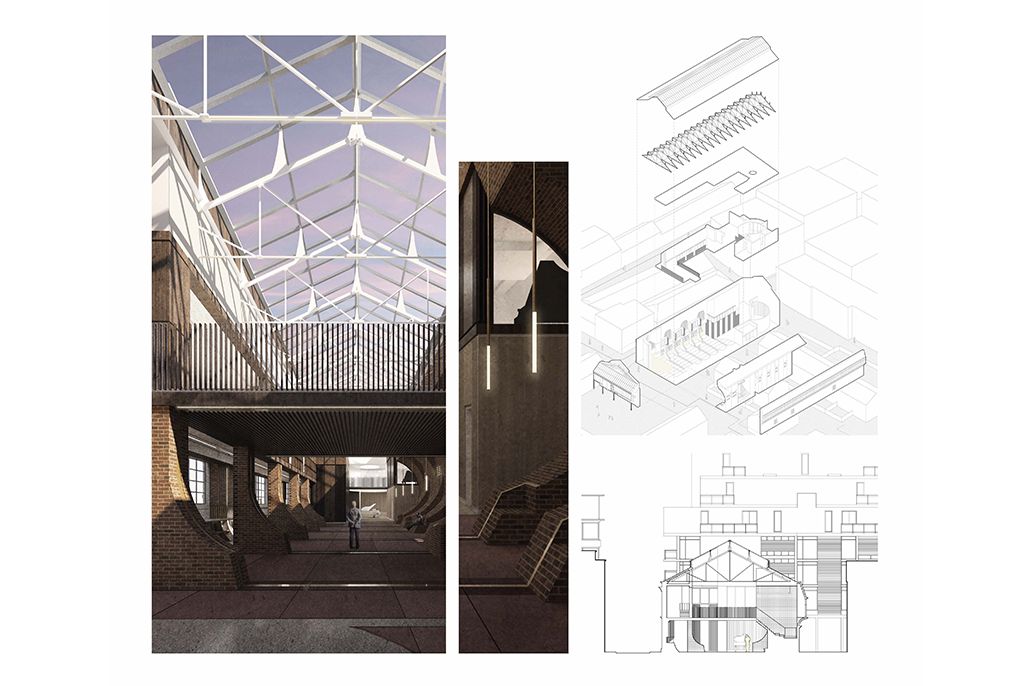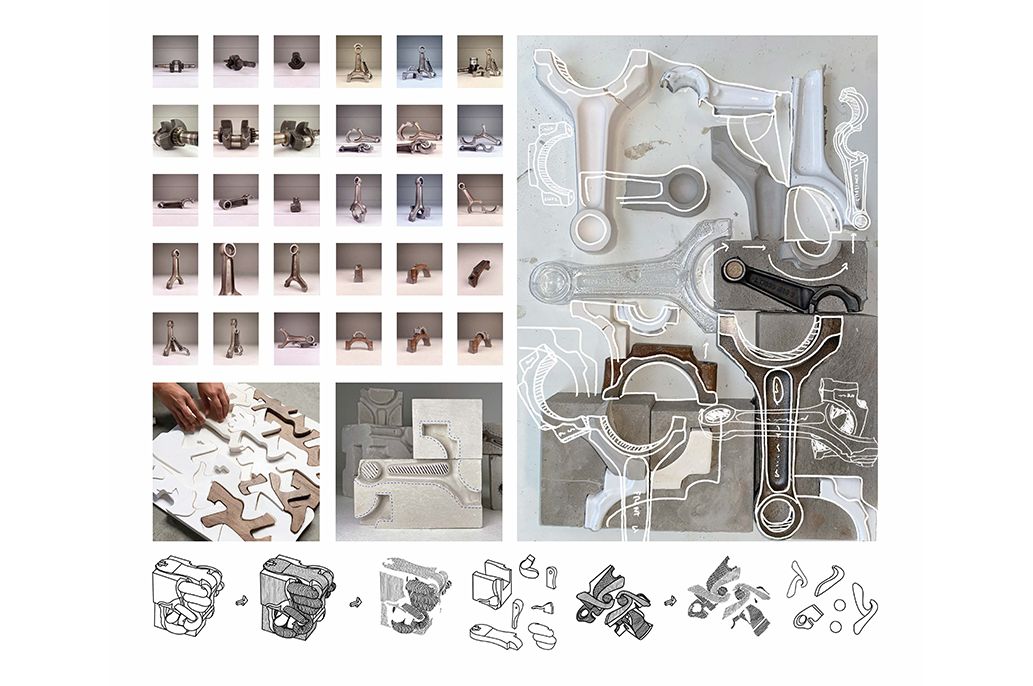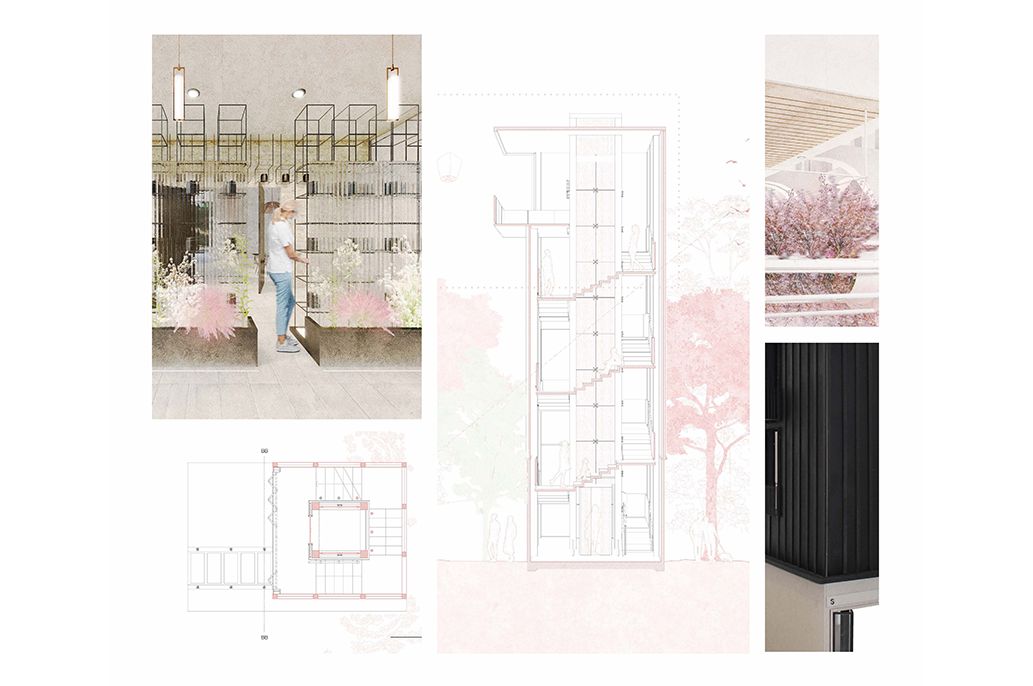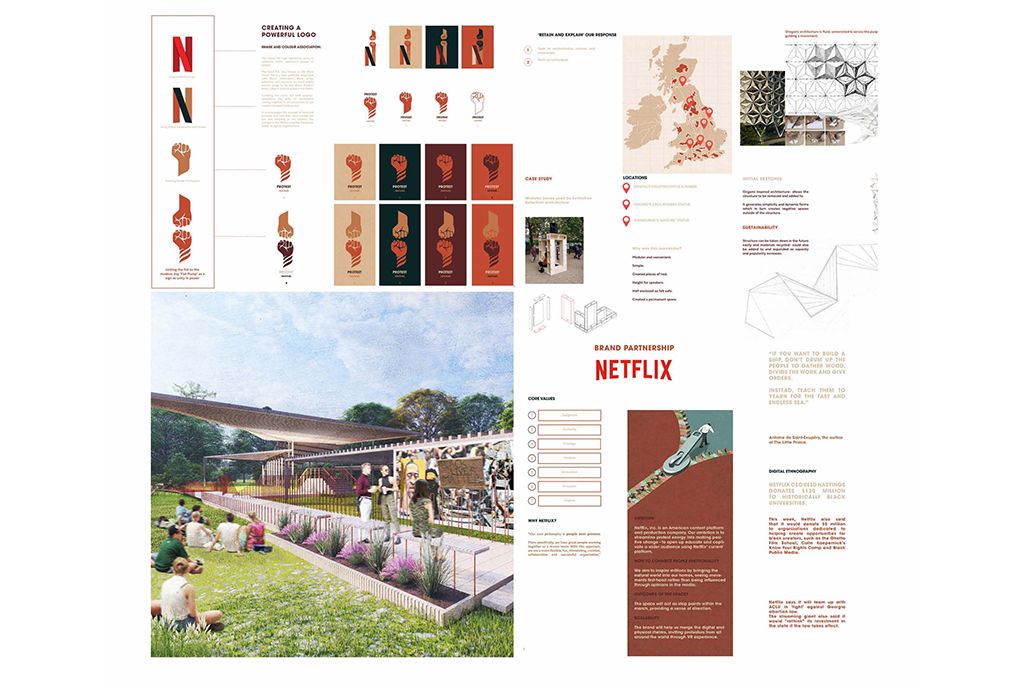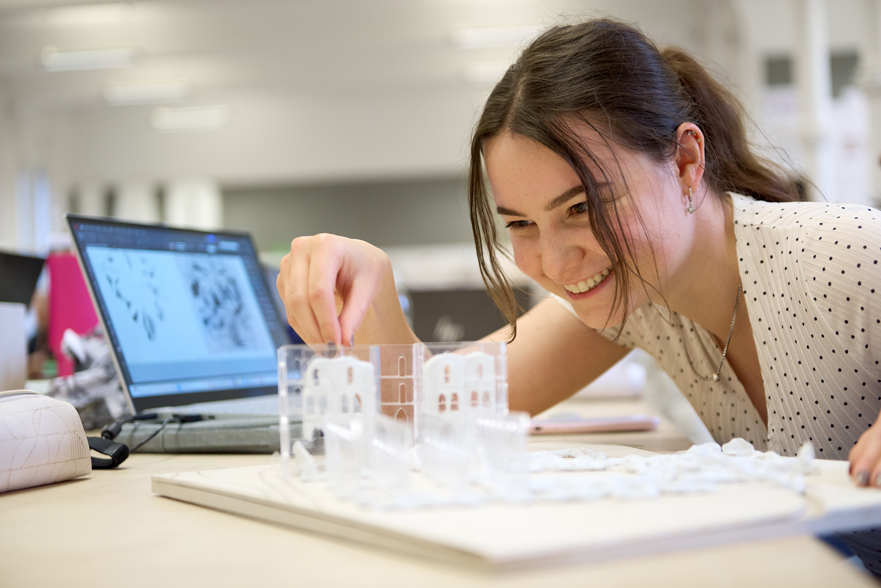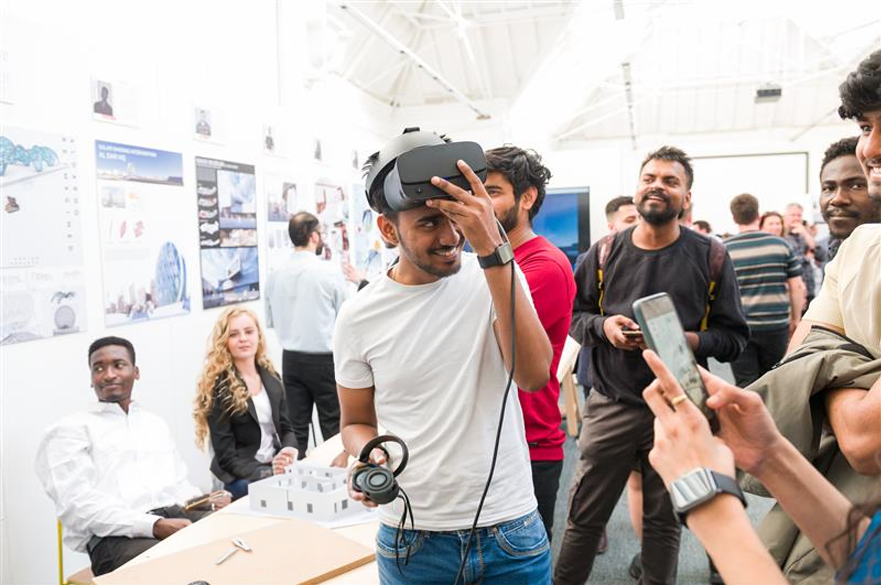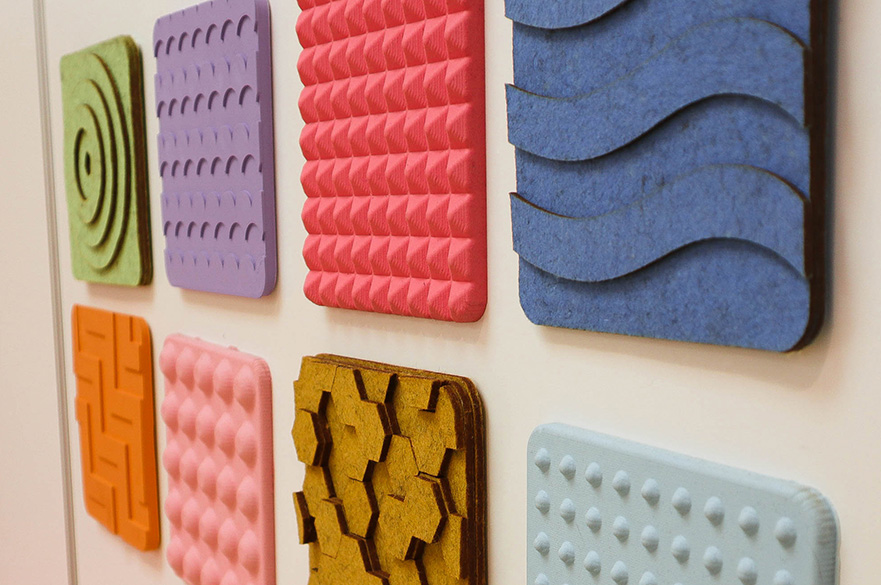Beat the Clearing queue
About this course
Dynamic, creative and hands-on, the BA (Hons) Interior Architecture and Design course will equip you with all the skills needed to create spaces that are beautiful, functional and sustainable.
You'll explore the design and development of internal environments in relation to their architectural composition, considering key factors such as structure and light. You'll develop your identity as a designer through hands-on module content that will teach you key transferable skills and prepare you for a successful graduate career in architectural design, interior decoration or interior design.
Best of all, you'll be based in our Grade II* listed Gothic Revival style Arkwright building with access to a studio culture that reflects modern practice. It's an environment that challenges you to work collaboratively, share experiences and experiment with your ideas.
You’ll also get the opportunity to work on live design projects, with creative briefs from real clients.
Want some inspiration? Explore the work of our graduating Class of 2024 in our Student Showcase.
Compare our courses to find out how this course differs from BArch (Hons) Architecture and BSc (Hons) Architectural Technology.
-
Learn from the experts — Architecture at NTU is ranked 1st in the UK for Teaching Quality (Times and Sunday Times Good University Guide, 2025).
-
Study in the heart of Nottingham — one of Europe’s top 25 student cities, and home to over 75,000 learners.
-
Complete a paid placement — some students have secured experience with companies including BDP, Dalziel & Pow, FITCH, Foster + Partners and Tom Dixon Studio.
-
We're the 2nd most sustainable university in the world (UI GreenMetric World University Rankings 2024).
What you’ll study
Our course is designed to help you develop the key skills needed for a career in interior architectural design.
Modules you will study include:
Year One
- Design and Professional Skills 1 (20 credits)
- Design and Technology 1 (20 credit points)
- Interior Architecture and Design in Context 1 (20 credit points)
- IAD Design Studio 1 (60 credit points)
Year Two
- Design and Professional Skills 2 (20 credit points)
- Design and Technology 2 (20 credit points)
- Interior Architecture and Design in Context 2 (20 credit points)
- IAD Design Studio 2 (60 credit points)
Year Three
- Placement or Study Abroad
Final Year
- Research Project (20 credit points)
- Design and Technology 3 (20 credit points)
- Design and Professional Skills 3 (20 credit points)
- IAD Design Studio 3 (60 credit points)
Design and Professional Skills 1 (20 credit points)
- In this module, you will learn to conceptualise and communicate design ideas effectively using a variety of techniques.
- You’ll develop and apply concepts and proposals both independently and through collaborative group work, building skills in creative ideation and teamwork.
- You will have the opportunity to join as a student to the Chartered Society of Designers, you will start your CPD plan, invited to attend NTU Trent talks program and gain insights into employability, fairs and events.
Design and Technology 1 (20 credit points)
- You’ll learn to appraise, select, and implement appropriate technologies, materials, and structural elements while upholding ethical standards, professional responsibilities, and legal requirements in design.
Interior Architecture and Design in Context 1 (20 credit points)
- You’ll develop a critical understanding of the factors that shape design practice and learn to articulate research and analysis effectively in both written and design processes.
IAD Design Studio 1 (60 credit points)
- On this module you’ll generate and apply ideas, concepts, and proposals both independently and collaboratively, conveying your intentions effectively across visual, physical, recorded, written and verbal methods including ‘pin-up’ presentations.
- Through employer-led and simulated projects, you’ll work effectively and collaboratively with peers and industry professionals, alongside building your portfolio to enrich your academic journey should you go directly into your Final Year or foster employment prospects should you choose to undertake a placement.
Design and Professional Skills 2 (20 credit points)
- Building on your Year One CPD (continuing Professional Development), you will combine learning in relation to employability from individual and team-based activities, the NTU talks program, experiences including mock interviews, job fairs, exchange and design events.
- You’ll refine 2D and 3D visual techniques, including CAD-based orthographic drawing, digital visualisation, and sustainable model-making materials, meeting professional conventions from design inception through to construction.
Design and Technology 2 (20 credit points)
- This module builds your understanding of construction principles, environmental impact, and material applications while meeting industry expectations for sustainable design.
- You’ll explore the impact of design choices at cultural, financial, and political levels and apply regulatory standards. Through collaborative learning and integrated studio sessions, you’ll communicate technical recommendations to peers and industry professionals.
Interior Architecture and Design in Context 2 (20 credit points)
- This module develops your critical response to theories related to 20th-century architecture, interiors, and urban design, examining the impact of diverse cultures and communities on design ideas and architectural legacies.
IAD Design Studio 2 (60 credit points)
- On this module, you’ll conceptualise and convey your ideas using various communication methods, and generate innovative solutions independently and collaboratively.
- Through employer-led and simulated projects, you’ll work effectively and collaboratively with peers and industry professionals, aimed to replicate practice/work environment. You will enhance your portfolio from Year One to prepare you for placement or your Final Year of study.
- You will review, select, and implement appropriate technologies, structural and interior elements, and materials while adhering to ethical working practices and professional responsibilities within the field.
Sandwich placement year
In your third year, you'll have the opportunity to take a year-long, full-time placement.
This year in industry will offer you hands-on experience, adding invaluable knowledge and skills to your CV. Many students return to their placement company after graduation, having developed a useful network of contacts within the industry.
Recent placement destinations have included Benoy, KSS Architects, FITCH, L'Oreal, Hilton, and Dalziel & Pow, working in roles such as junior designer, assistant designer, interior architectural assistant, and more.
Successful completion of the placement year leads to an extra qualification – the Diploma in Professional Practice.
Study abroad
If you're studying on our sandwich route you can also opt to study abroad for a full academic year, or for a semester, during Year Three. This is an optional and additional period of study that complements your degree at NTU as an alternative to taking a work placement.
This is an exciting opportunity to experience a different national culture, teaching and learning styles and subjects in an international environment. The destination university must be a year abroad / exchange partner of NTU or member of a formally recognised scheme such as the International Student Exchange Programme (ISEP).
Our NTU Global and student mobility team will support you in finding the right opportunity from one of the many international partners available around the world.
Successful completion of a period of international study will earn you a standalone award – an International Study Certificate (minimum six weeks) or the International Study Diploma (minimum 36 weeks).
Research Project (20 credit points)
- This module offers you the opportunity to explore a subject of personal interest, allowing you to conduct in-depth research on topical and relevant debates. You will negotiate your chosen topics with tutors and engage in collaborative research, enabling you to present your findings in a traditional narrative format or a mixed visual and narrative form using various technologies.
Design and Technology 3 (20 credit points)
- This module will help you develop effective strategies for thermal comfort, acoustics, lighting, structure, and materials, all aimed at enhancing your understanding and responding to design briefs that complement your studio work.
- You will apply technical, environmental and sustainable practice-based and legislative knowledge that is relevant to your design process and apply it to the resolution of design challenges.
Design and Professional Skills 3 (20 credit points)
- This module helps to improve your skills in using 2D and 3D visual tools to share your design ideas. You’ll gain practical experience with software, visualisation techniques, and presentation methods to effectively show your creativity.
- Building on from your year 2 CPD (continuing Professional Development), you will include element of reflection with respect to future employability and career aspirations.
IAD Design Studio 3 (60 credit points)
- This module encourages you to think independently and reflect on your work. Through continuous iteration in the studio, you'll integrate research, synthesis, and evaluation of specific design issues, allowing you to develop and define your projects comprehensively. You’ll explore the connections between context, site, and function, as well as the social and political factors that influence your design.
- Through the projects, you’ll work effectively and collaboratively with peers and industry professionals. You will participate in the NTU showcase to enable you to participate in networking and graduate opportunities.
Exhibiting as part of our Student Showcase
In your final year, you'll be invited to display your work as part of ADBE's Student Showcase. The events are an opportunity for all final year students studying across NTU's Art and Design-based courses to showcase their work to our network of industry professionals and prospective employers, invited specifically for this purpose.
Students on this course also have the opportunity to be selected to exhibit their work at external graduate shows in London. Along with other Interior Architecture and Design graduates from across the UK, you will present your work to industry and be in with a chance of winning industry-sponsored prizes, or securing a graduate role.
We regularly review and update our course content based on student and employer feedback, ensuring that all of our courses remain current and relevant. This may result in changes to module content or module availability in future years.
Don’t just take our word for it, hear from our students themselves
Student Work
Video Gallery
How you're taught
You’ll learn through a mix of:
- lectures - covering the key theories
- studio projects - working both independently and as groups
- live briefs - from industry and competitions
- project work - self-directed learning with the support of NOW, our virtual learning environment
- 1-2-1 sessions with tutors
- specialist surgeries - designed to give you support and advice
A placement year may be taken between year 2 and year 3 of study.
Outside of timetabled sessions, you'll undertake self-direct independent study including preparing for lectures, researching, completing coursework, developing a portfolio, and directed reading to expand your knowledge.
The course has elements of both Interior Design and Architecture. We combine these two disciplines to reflect the nature of the industry. As an Interior Designer today, having an understanding of architecture puts you at an advantage and this makes our students highly desirable upon graduation.
We are often asked how mathematical the course is – mathematics is not a focus on this course as Interior Designers and Architects working in the industry today often work with engineers and software that cover this aspect.
Live projects
We provide opportunities for you to engage with industry throughout your studies, and coursework projects are a great way to apply your skills and showcase your capabilities.
Study trips
Field trips and study visits are an important part of your learning. Trips may include site visits and visits to practices, museums, exhibitions and events. Where a trip is mandatory it will be aligned to your modules and inform project work, and substantive costs – including travel and accommodation – will be paid for by the school.
Optional trips may also be organised which can provide additional opportunities to enhance your knowledge and experience. Optional trips will incur an additional cost of approximately £500 for participating students.
A valid passport and any associated visas will be required for trips outside of the UK.
95% of BA (Hons) Interior Architecture and Design sandwich students are positive their course challenges them to achieve their best work (NSS, 2024).
Design studios
Your design studios are a big part of your learning and reflect the approach typically encountered in professional interior architecture and design practice. Collaboration is key as you study with your peers to address a range of creative approaches, moral, aesthetic, and theoretical positions related to your projects.
Study group tutorials
The study group tutorials are structured to replicate team meetings that are commonplace in design practices. Lecturers will provide teaching support in the studio as you apply your theoretical and practical skills to design projects. You're encouraged to articulate your design proposals in an objective and critical manner and to develop interpersonal communication skills which are invaluable to any walk of professional life.
How you're assessed
People excel in different ways, and we want everybody to have the best possible chance of success. You will be assessed through:
- coursework, including group projects, case studies, research projects and live briefs
- practical assessments, such as individual projects and presentations of project work, and a portfolio.
Contact hours
You'll spend approximately 10 hours per week in scheduled learning.
Careers and employability
Where do Interior Architecture and Design graduates from NTU work?
NTU has a strong architecture alumni community, with many graduates working in senior positions in leading national and international companies. Recent graduate roles include interior designers, junior designers and consultants, at companies including:
- Conran & Partners
- BDP – Building Design Partnership
- TP Bennett
- Peldon Rose
- Brinkworth
- Thirdway
- Macaulay Sinclair
- Faber Design
- Bluesky Design
- Atelier New York
CSD accreditation
By enrolling in this programme, you'll gain complimentary student membership of CSD for the duration of your studies. This is the first step in a professional design career offering graduates exemptions in the application process, timescale and costs in achieving ‘Chartered Designer’ status.
Our Employability team
Our expert Employability team will work closely with you at every stage of your career planning, providing personal support and advice. You can benefit from this service at any time during your studies, and for up to three years after completing your course.
Throughout the year, they run a series of events specifically for students studying in the School of Architecture, Design and the Built Environment. Our Architecture Exchange event brings together current students and prospective employers for an evening of presentations, table discussions and networking. We also run a Built Environment Careers Fair, offering employers the opportunity to advertise graduate roles to our final year students.
Excellent placement opportunities
By choosing our sandwich (four-year) route, you’ll have the opportunity to undertake a year-long work placement during your studies, giving you the chance to gain hands-on experience within the industry. The majority of placement students receive a salary.
Gain an extra professional qualification
Successful completion of the 36 weeks leads to an extra qualification – the Diploma in Professional Practice, which will further enhance your CV.
NTU Enterprise
You'll also have the opportunity to turn your ideas into a viable business with help from NTU Enterprise, NTU's purpose-built Centre for Entrepreneurship and Enterprise, a support centre to help students create, develop and grow their own businesses.
What our students are doing now
Showcase 2025 Student Spotlight: Yusuf Chowdhury
Student Spotlight featuring BA (Hons) Interior Architecture and Design student Yusuf Chowdhury and his project 'Algorithmic Infestation'.
Showcase 2025 Student Spotlight: Rozerin Binboga
Showcase 2025 Student Spotlight: Lillie Roe-Wade
Campus and facilities
Historic setting, modern practice
As an Interior Architecture and Design student you'll have full access to our dedicated studio space, based in our Grade II* listed Gothic Revival Style Arkwright building. This is where you'll spend the majority of your time studying, supported by our expert team of academic and technical staff.
Entry requirements
UK students
Standard offer: 112 UCAS Tariff points from up to four qualifications (two of which must be A-level equivalent)
Contextual offer: 104 UCAS Tariff points from up to four qualifications (two of which must be A-level equivalent)
Other requirements
To find out what qualifications have tariff points, please use our tariff calculator.
Additional requirements for UK students
There are no additional requirements for this course.
Contextual offers
If you don’t quite meet our entry requirements, we might be able to make you a lower offer based on a range of factors, including your background (such as where you live and the school or college you attended), your experiences and your individual circumstances (you may have been in care, for example). This is called a contextual offer, and we get data from UCAS to help make these decisions. We do this because we believe everyone with the potential to succeed at NTU should have the opportunity to do so, no matter what barriers you may face.
Meeting our entry requirements
Hundreds of qualifications in the UK have UCAS Tariff points attached to specific grades, including A-levels, BTECs, T Levels and many more. You can use your grades and points from up to four different qualifications to meet our criteria. Enter your predicted or achieved grades into our Tariff calculator to find out how many points your qualifications are worth.
Other qualifications and experience
NTU welcomes applications from students with non-standard qualifications and learning backgrounds, either for year one entry or for advanced standing beyond the start of a course into year 2 or beyond.
We consider study and/or credit achieved from a similar course at another institution (otherwise known as credit transfer), vocational and professional qualifications, and broader work or life experience.
Our Recognition of Prior Learning and Credit Transfer Policy outlines the process and options available for this route. If you wish to apply via Recognition of Prior Learning, please contact the central Admissions and Enquiries Team who will be able to support you through the process.
Getting in touch
If you need more help or information, get in touch through our enquiry form.
International students
Academic entry requirements: 112 UCAS Tariff points from up to four qualifications. Two of which must be A-level equivalent. We accept equivalent qualifications from all over the world. Please check your international entry requirements by country.
English language requirements: See our English language requirements page for requirements for your subject and information on alternative tests and Pre-sessional English.
Other requirements
Additional requirements for international students
If you need help achieving the academic entry requirements, we offer a Foundation preparation course for this degree. The course is offered through our partner Nottingham Trent International College (NTIC) based on our City campus.
English language requirements
View our English language requirements for all courses, including alternative English language tests and country qualifications accepted by the University.
If you need help achieving the language requirements, we offer a Pre-Sessional English for Academic Purposes course on our City campus which is an intensive preparation course for academic study at NTU.
Other qualifications and experience
If you have the right level of qualifications, you may be able to start your Bachelors degree at NTU in year 2 or year 3. This is called ‘advanced standing’ entry and is decided on a case-by case basis after our assessment of your qualifications and experience.
You can view our Recognition of Prior Learning and Credit Transfer Policy which outlines the process and options available, such as recognising experiential learning and credit transfer.
Sign up for emails
Sign up to receive regular emails from the International Office. You'll hear about our news, scholarships and any upcoming events in your country with our expert regional teams.
Getting in touch
If you need advice about studying at NTU as an international student or how to apply, our international webpages are a great place to start. If you have any questions about your study options, your international qualifications, experience, grades or other results, please get in touch through our enquiry form. Our international teams are highly experienced in answering queries from students all over the world.
Policies
We strive to make our admissions procedures as fair and clear as possible. To find out more about how we make offers, visit our admissions policies page.
